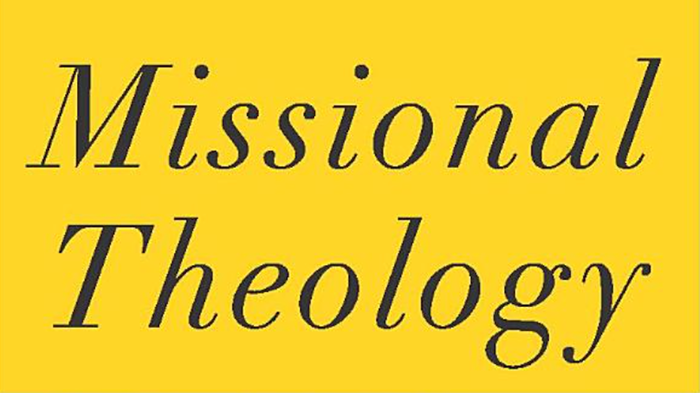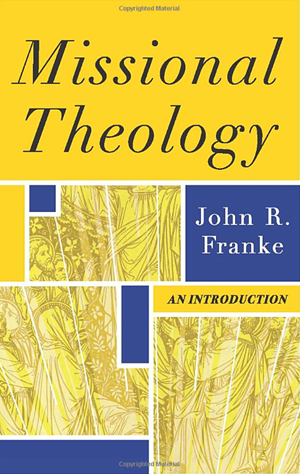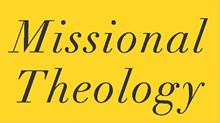Our Missional God

A missional theology begins by recognizing that God is missional. The mission of the church then is nothing other than participating in the mission of God, often expressed in Latin as missio Dei.
But this requires some exploration and some questions I have about what it means to connect God, mission, the church, love, participation and relationality. We are doing this by reading through the wonderful new study of missional theology John Franke called Missional Theology: An Introduction.
I want to begin where Franke begins – with an opening thesis-like set of claims:
The starting point for missional theology is the notion of a missional God. This means simply that God is, by God’s very nature, a missionary God. In a more classical theological rendering, it means mission is an attribute of God. From this perspective, ac-cording to South African missiologist David Bosch, “mission is not primarily an activity of the church, but an attribute of God. God is a missionary God.” Put another way, in the oft repeated words of renowned German theologian Jürgen Moltmann, “It is not the church that has a mission of salvation to fulfill to the world; it is the mission of the Son and the Spirit through the Father that includes the church, creating a church as it goes on its way.”
These are strong ways of putting the renewal of theology proper by focusing not on essence and attributes but on God as love, God as relatiional, God as missional.
Franke then discusses how “mission” was originally connected to “evangelism” (only, or primarily) and how in the international missions movement (IMC: International Missionary Council; then WCC: World Council of Churches) the very understanding of mission/missions shifted from evangelism-only to missio Dei and thus mission expanded beyond evangelism to be God’s design for all creation. So,
During the centuries preceding the development of missio Dei theology, mission had been understood in a variety of ways: in terms of salvation, in which individuals are rescued from eternal condemnation; in terms of culture, in which people from the majority world are introduced to the blessing and privileges of the Christian West; in ecclesial terms, in which the church expands and survives; and in social terms, in which the world is transformed into the kingdom of God by evolutionary or cataclysmic means.
Missio Dei theology and thus missional theology reframes such categories.
Missio Dei theology asserts that God has a particular desire, arising from God’s eternal character, to engage with the world.
This is expounded quicky through the whole Bible into the history of the church. Mission thus becomes central to God and to the Bible’s very design.
On the other hand, if mission is part of God’s very nature, then only a missional church can fully, truly worship such a God.
This leads to a shift of significance:
In the post-Willingen context, the age of “missions” comes to a condusion and the age of mission commences. Hence, we distinguish between the mission of God and the mission activities of the church and confess that the latter are authentic only when they faithfully participate in the missio Dei.

Franke, the theologian, examines Trinitarian theology in quick but incisive compass. God’s relationality shapes God’s identity: God as Father and Son and Spirit are in eternal, perichoretic relation and are who they are in relation to one another.
Thus, God “is as God acts” and “God is as God does, and what God does is love.” God has always been and always be in relation (Trinitarian relations) in giving, receiving, and sharing love. So, then, God is all about relationality. He sketches LaCugna, Johnson, and Jenson as three theologians (and others) who have relational identity in God as Trinity. Thus, God is love is all about the relation of the Trinity.
This shapes mission, and it is at this point that I was jotting notes to myself with some questions, which I will get to below.
This missional pattern, manifested in the world through the sending of the Son and the sending of the Spirit out of love for the world, is lived out and expressed in the context of the eternal community of love; it points to the missional character of God, who seeks to extend the love shared by Father, Son, and Holy Spirit into the created order.
I will proceed to list now the five marks of mission and then offer a little response to Franke.
Evangelism: to proclaim the good news of God’s kingdom
Formation: to teach, baptize, and nurture new believers
Compassion: to respond to human need by loving service
Justice: to seek to transform unjust structures of society
Creation care: to strive to safeguard the integrity of creation and sustain and renew the life of the earth.[SMcK: Does the above five marks not now mean that mission is an activity, not a relationality?]
I am concerned about the near equation of love with mission and love with sent. The issue here is that he has defined God’s love as relationality, and I totally agree. Which would lead to a corresponding reality in humans with God in terms of relationality.
But it seems that sent is how love is defined in some ways. Yes, he makes love prior and the basis of sent but in the end relationality is not the defining points of mission but instead sent is.
I don’t believe it is fully accurate to define love as sent. Love is relationality and love extends and reaches out to the other in order to commune in love, but a “missional” God then is not so much a “sending” God but a “relational” God. So, an eternality to sending and mission misses.
This is a difference with clear distinction and I’m not sure I see it here. The mission of God is to relate in love to creation and to each of us, and that prompts God to send the Son and the Spirit to commune with us. What is eternal is the relationality of God, not the mission, not the sending.
The above five marks of mission are insufficiently relational. They are features of the God of love’s sending but not enough of the God of love’s relationality.
Thoughts?
Jesus Creed is a part of CT's
Blog Forum. Support the work of CT.
Subscribe and get one year free.
The views of the blogger do not necessarily reflect those of Christianity Today.




















